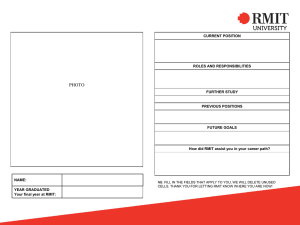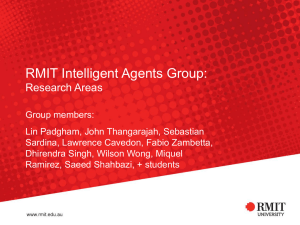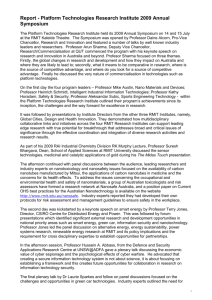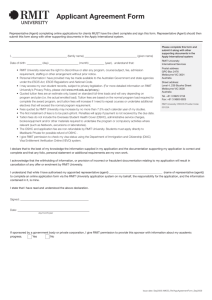RMIT Life Sciences
advertisement
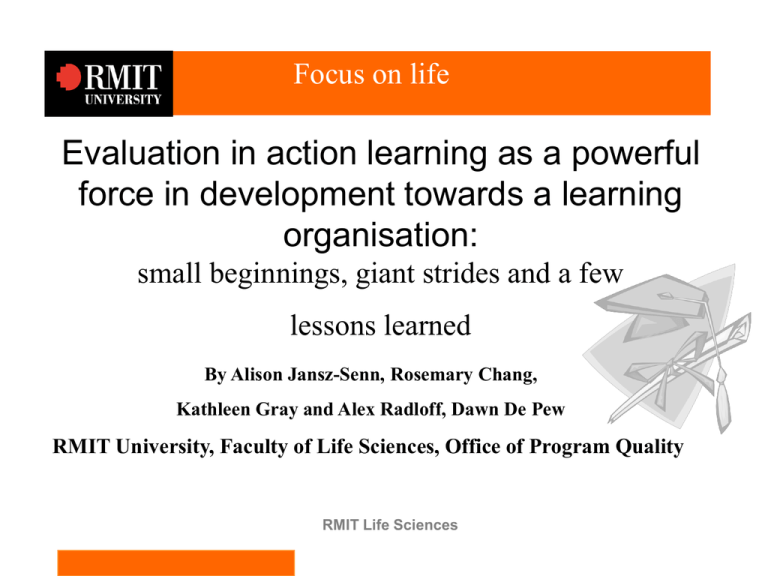
Focus on life Evaluation in action learning as a powerful force in development towards a learning organisation: small beginnings, giant strides and a few lessons learned By Alison Jansz-Senn, Rosemary Chang, Kathleen Gray and Alex Radloff, Dawn De Pew RMIT University, Faculty of Life Sciences, Office of Program Quality RMIT Life Sciences Focus on life In 2002 and 2003 the Faculty of Life Sciences, RMIT University sponsored Strategic Initiatives Projects (SIP’s) as staff professional development in teaching and learning SIP’s combines Action Learning and Evaluative practices in building of staff capability and organisational learning in the improvement to program performance. RMIT Life Sciences Focus on life Small Beginnings. • The SIP projects in 2002 and 2003 Giant Strides • The improvement of teaching quality and the building of staff and organisational capabilities Lessons learned • What have we gained and how can we do it better RMIT Life Sciences Focus on life SIP’ s Objectives • Facilitate innovation with teaching and learning technologies, • Develop graduate capabilities through changed teaching practices, • Disseminate advances in teaching and learning in the Life Sciences • Improve the quality of teaching and learning in more than one RMIT program. RMIT Life Sciences Focus on life Evaluation of SIPs in 2003 For what purpose ? - Achievement of SIP’s project objectives - Achievement of Individual project objectives - Organisational learning RMIT Life Sciences Focus on life Evaluation of Strategic Initiatives Projects (SIPs) 2002 and 2003 We attempted to measure: • Achievement of Strategic objectives • Extent of use of action learning and evaluative practice • Extent of personal, professional and organisational learning Study Design: Using both quantative and qualitative data • Document and Data analysis • Interview • Questionnaires RMIT Life Sciences Focus on life Evaluation Framework Senge’s Five Disciplines for the Learning Organisation: Action Learning -Personal Mastery -Mental Models -Shared Visions -Team Learning Evaluative Practice -Systems Thinking RMIT Life Sciences Focus on life Figure 1: THE THEORY OF ACTION OUTCOMES ACTION LEARNING Critical attitude, Research, Accountability, Selfevaluation. Plan, Act, observe and Reflect Evaluative Practice Building Staff Capability Evaluative frameworks, Program Logic, Questionnaires Feedback loops INDICATORS Knowledge and skills in Teaching and Learning Conference Presentations Personal Mastery Mental Models Systems Thinking Projects that cross departmental boundaries Innovative technologies Assessment Educational Research Project Management Developing Questionnaires Focus groups Scholarship Organisational Learning Shared Visions Journal Articles Presentation at Faculty and University Forums Team Learning Projects that involve the community or industry partners RMIT Life Sciences Focus on life Achievement of Strategic objectives • • • • Facilitating innovation with teaching and learning technologies, Developing graduate capabilities through changed teaching practices, Disseminating advances in teaching and learning in the life sciences Improving the quality of teaching and learning in more than one RMIT program. Outcomes: In 2002 an 2003 all four outcomes were achieved RMIT Life Sciences Focus on life Action Learning and Evaluative Practice In 2003 10 of the 12 respondents indicated that they had developed their skills as action researchers “I am embarrassed to admit that I’m not sure just what an action research is. However, working through the evaluation process( pre & post tests and focus groups design) has been valuable and will inform future work of this nature” “I have a better understanding of this approach in the student-teacher relationship” “A grounded practical detail knowledge of making a new form of assessment a workable entity” 10 of the 12 respondents indicated that they had enhanced their skills and understanding of evaluation methods “I have a better understanding of the difficulties involved in using meaningful evaluation methods” RMIT Life Sciences Focus on life A few Lessons learned •Despite the high demands on their time, the academic staff have found this a very worthwhile project. •There has been a building of staff capability across programs •The projects have offered the opportunity for sharing new knowledge and skills across the organisation. RMIT Life Sciences Focus on life Building Staff Capability: Personal, Professional and Organisational Learning Personal & Professional Learning • • • • • • • Innovate technology Scholarship Assessment Assessment instruments educational research developing questionnaires and using focus groups. project management Organisational Learning • Formal and informal opportunity to share their learning through meetings, workshops, forums, conferences, reports, journals and informal discussions RMIT Life Sciences Focus on life Conclusion: Action learning has provided the disciplines of Personal Mastery, Mental Models, Shared Visions and Team learning. Evaluative practice has provided the Systems thinking. “ These small projects have achieved giant strides and the time and commitment to supporting the project teams has been a worthwhile investment in professional development”. RMIT Life Sciences Focus on life Questions for Discussion: -How do we ensure that there is organisational learning and how important is it anyway? -”Take the money and run”- How do we ensure that an Action Research Strategy will give us the Strategic objectives and Project objectives that we set out to achieve? RMIT Life Sciences
